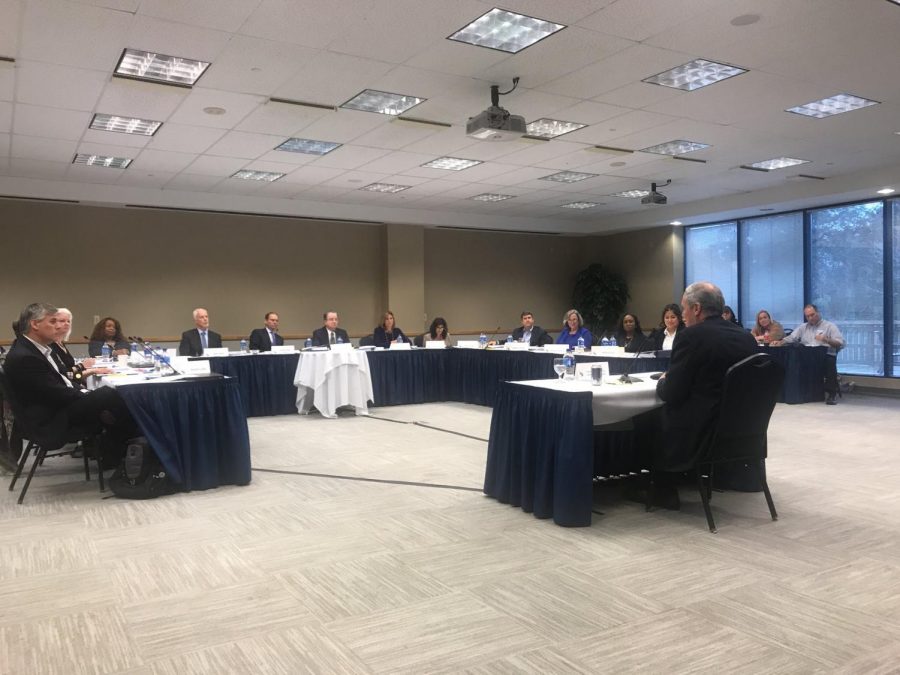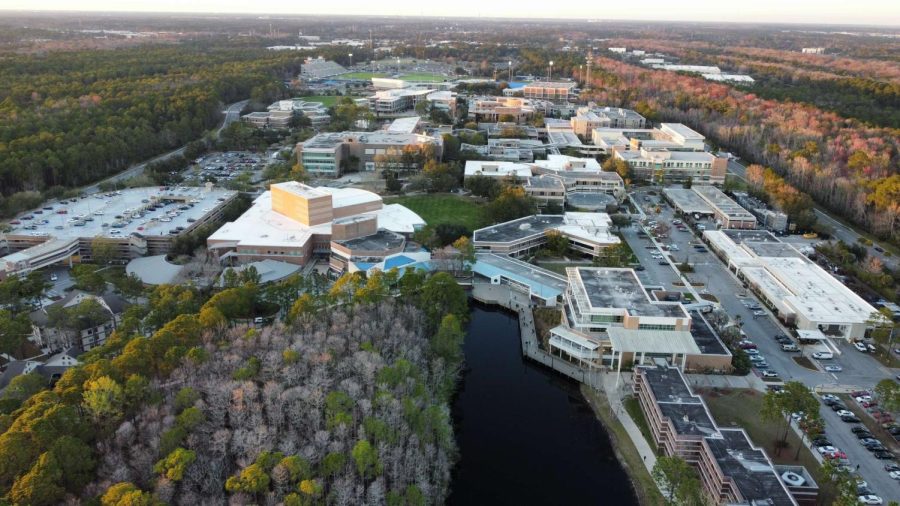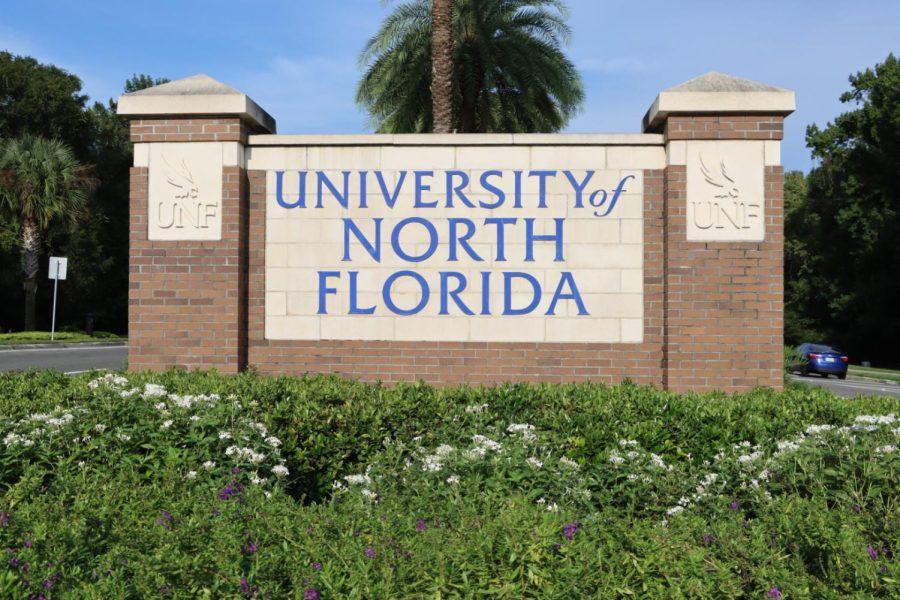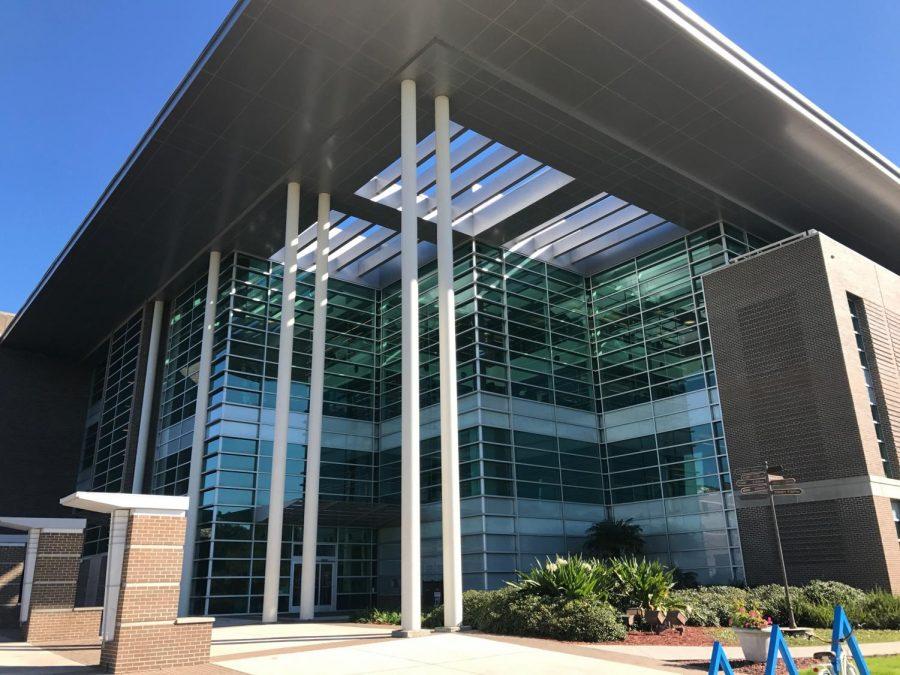“Today is the fun day,” said Laurie Wilder, President of Parker Executive Search, beginning the orientation.
The presidential search committee will be interviewing all 12 presidential candidates on Feb. 6-7 in hopes of narrowing down the search for UNF’s next president.
Wilder spoke for the majority of the orientation, explaining the interview process to the search committee. Each interview lasts 75 minutes and consists of 12 questions, not counting any follow-up questions the committee members may have. Candidates don’t know what questions will be asked.
Committee members were assigned questions to ask the candidates. Wilder advised them to remain consistent with their questions to each candidate in order to remain fair.
After the committee asks their questions, candidates will have a chance to ask the committee questions of their own.
“Just like you are learning about them, they are trying to learn about you,” Wilder said.
Wilder told the committee that the candidates’ questions might be even more important than their answers, as they give the committee a sense of what the candidates are thinking.
At the end of the day, there will be a discussion among committee members to go over their initial thoughts of the candidates. No action will be taken until the deliberation after the final interview on Feb. 7.
Interview with Charles Robinson
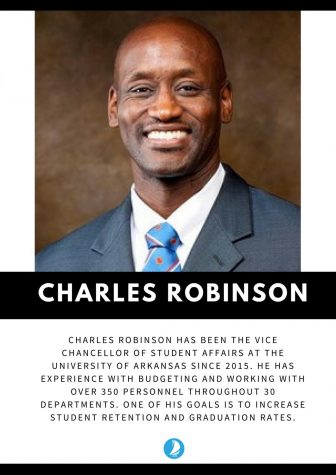
The first candidate of the day, Charles Robinson walked in exactly at 8:15 a.m. Robinson has been the Vice Chancellor of Student Affairs at the University of Arkansas since 2015.
Robinson began as a history professor, which he referenced several times in his interview. He told the committee how he thought he wanted to be a professor for the rest of his career, and joked that his faculty co-workers told him he had joined “the dark side” by becoming an administrator.
As a past faculty member, Robinson said he would make sure faculty had a voice and role in decisions. He even said he would like to continue teaching at least one class if he becomes president, in order to connect with faculty at UNF.
Robinson wants to focus on connecting with the community and encouraging students to engage. Part of his plan is to create an inclusive campus community that reflects a larger society, in order for students to create “learning opportunities for people, whether student, faculty or staff.”
He also wants to improve communication with students. According to Robinson, the more you know about them, the better you can help them.
“Students are not one-minded,” Robinson said. “They are complex and diverse. That’s the beauty of working with them.”
Towards the end of the interview, Robinson asked the committee what they were looking for in their future president, as well as the greatest challenges UNF faces moving forward. He then told the committee he has been philosophically pondering over the presidential role.
“The job of the president is to articulate the concerns and challenges of the campus community, and talk about how we would like to move,” Robinson said.
Robinson made a historical reference to the Puritans, who came to America to create a “city on a hill”, and to be seen as an exemplary society. Similarly, Robinson wants to engage and motivate a sense of mission. He wants to work together towards a simple, common goal: for students to be successful.
“You have a lot to work with here, and I’d be honored to be able to come here and truly see this is a city on a hill,” Robinson said.
Interview with Frank Neville
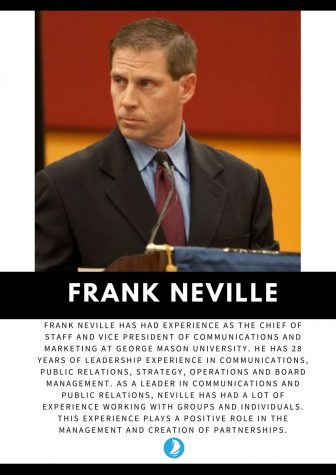
After the orientation and interview with Charles Robinson, the Presidential Search Committee took a short break. Following the break, the committee interviewed Frank Neville from George Mason University.
“There’s a lot of glass half full here at UNF,” said Neville. “There’s a great staff and well designed programs.”
He believes there is also a lot of momentum, which he wants to be a part of. “At George Mason, I’m involved with pretty much everything,” said Neville. “I would bring some experience in almost every area.”
He also said he would be a “passionate advocate” for UNF just as he has been for George Mason University. He believes making a difference is important, saying, “if we aren’t here to make the world a better place, then why are we here?”
Some vital characteristics that he believes the university president should have are the ability to increase student retention and engagement, and the ability to listen to the needs of students and the community. Neville said being an advocate for the university and being self-reflective are also fundamental characteristics for a university president.
The president has “a responsibility to help students succeed as quickly and efficiently as possible,” said Neville. He mentions one problem with student success is when credits can’t be carried over to another university.
Neville said, “The biggest mistake you can make is assuming everything is fine and not talking to people.”
Some questions Neville would ask as a president are: who are we, what are our values, and where are we headed.
Neville believes “a university should reflect the community it serves,” and it should be seen as a role model for other universities. He then pointed out that the decisions administrators and faculty make affect each other as well as the university and students.
Regarding funding, Neville said he is involved in a $500 million fundraising campaign at George Mason, which he believes might reach $600 million. When trying to raise funds, Neville believes getting people excited about it is necessary.
Neville also said it is important to make sure that when students leave they are ready for what’s next. He believes student engagement is a priority, and being able to follow through with original plans and promises is critical as well.
As the interview concluded, Neville said, “This is a team sport. Everyone has a role to play.” He then thanked the committee.
Interview with David Szymanski
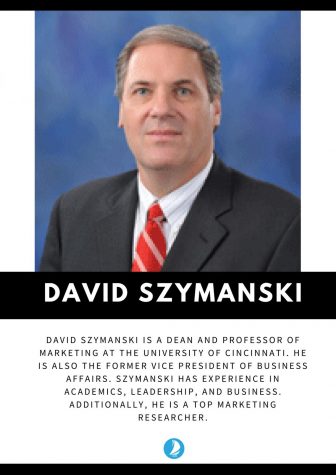
The next candidate was David Szymanski, Dean and Professor at the University of Cincinnati.
“Being a dean is great preparation for being a president,” Szymanski said, adding that he has learned how to “bring the community into the university, and bring the university into the community.”
He said he also has experience growing university programs, working with unions, and shaping and improving companies.
Szymanski stressed the importance of student well-being and making college more accessible to students. He believes some goals of a university president are having an understanding of athletics, breaking down and solving problems, and creating a social support system for students. At the University of Cincinnati, Szymanski said there is a high retention rate. Students come, stay, graduate, and get employed.
Szymanski said he has helped increase student retention and graduation rates by ten percent at the University of Cincinnati.
A personal goal of his would be to bring students of all majors closer together in the university. Creating a place where the students can come together and socialize is important to Szymanski. He also wants to create culture and enhance funding research.
“At the end of the day, it is always about doing the right thing,” he added.
Szymanski believes it is essential to increase the number of minorities in the university, and to make sure they are successful.
He said creating a brand for students is also important. He wants to brand students as leaders with integrity, so when companies come to recruit, they know there are students here that they can trust.
Szymanski believes a president should see “value in developing relationships.” He said, “I’m pretty good at figuring out people and working with them.”
Figuring out student values is crucial to Szymanski. He said leaders need to work as a team that respects diversity of opinions and can be unified in serving the students.
Szymanski asks himself, “How do we make all of our students honors students?” He said he strives to create more honors programs to better prepare students for their future.
In a closing statement, Szymanski said he wants to make a difference by creating opportunities for students, staff, and the university.
—
For more information or news tips, or if you see an error in this story or have any compliments or concerns, contact editor@unfspinnaker.com.



